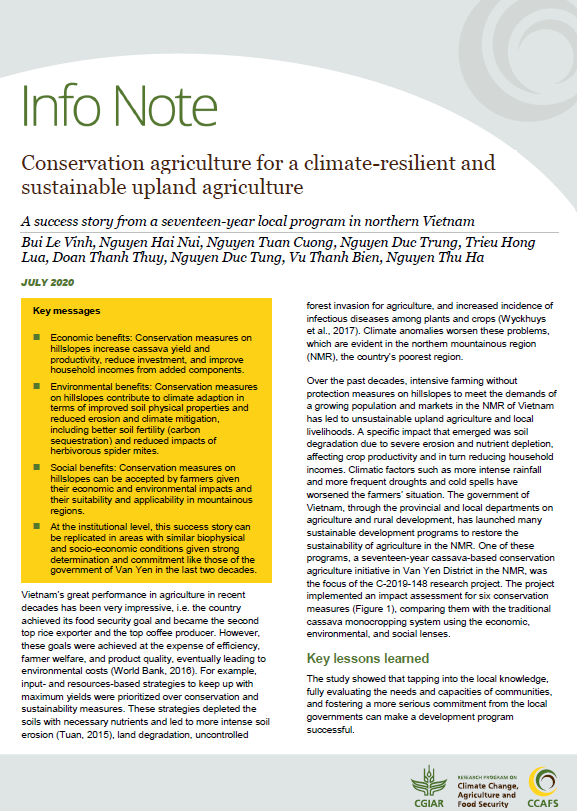Citation
Bui LV*, Vu TB, Talsma T, Spillane C, Do TTH, Nguyen TC, Trieu HL, Galina B, Peter M, Nguyen TH. 2021. Scaling the Climate-Smart Village model in national-level programs: The recommendations for adoption in the implementation of the Nông Thôn Mới (Vietnam’s National Target Program on New Rural Development) 2021-2030 Strategy. CCAFS Info Note. Wageningen, the Netherlands: CGIAR Research Program on Climate Change, Agriculture and Food Security (CCAFS). https://cgspace.cgiar.org/handle/10568/114949
Permanent link to share this item: http://crafs.vnua.edu.vn/en/uncategorized-en/handle-128/
*Corresponding author: Dr. Bui Le Vinh. Faculty of Natural Resources and Environment. Vietnam National University of Agriculture. Founder and leader of the CRAFS research group. Email: bui_le_vinh@yahoo.com, blvinh@vnua.edu.vn.
Key messages
- The Climate-Smart Village (CSV) model showcases rewarding outcomes for the agricultural sector of Vietnam, such as better farm productivity, improved climate resilience, and reduced greenhouse gas emissions.
- The New Rural Development Program or Nông Thôn Mới (NTM) is a national target program of Vietnam that has enabled 57% of rural communes to achieve the NTM status, which aims to raise the socio-economic standard of living of small communities while facilitating agricultural development.
- Agricultural development is threatened by the impacts of climate change, which carries high risk for an agriculture-dependent country like Vietnam.
- The CSV model1 can be applied in the NTM to help the communities under this program achieve “advanced” and “demonstration” status based on 19 criteria.
- Clear operational guidelines should be drafted to successfully integrate the CSV model into the NTM, alongside context-specific financial channels and monitoring and evaluation systems.
CRAFS Key Author ORCID iDs
Bui Le Vinh: https://orcid.org/0000-0003-1336-317X
Vu Thanh Bien: https://orcid.org/0000-0002-0632-1644
Notes: This working paper is a knowledge product of the CCAFS program and was conducted by researchers from the Climate-Resilient AgriFood Systems (CRAFS) research group of Vietnam National University of Agriculture (VNUA). Here is the permanent link to cite the original work: https://cgspace.cgiar.org/handle/10568/114949

 Tiếng Việt
Tiếng Việt
